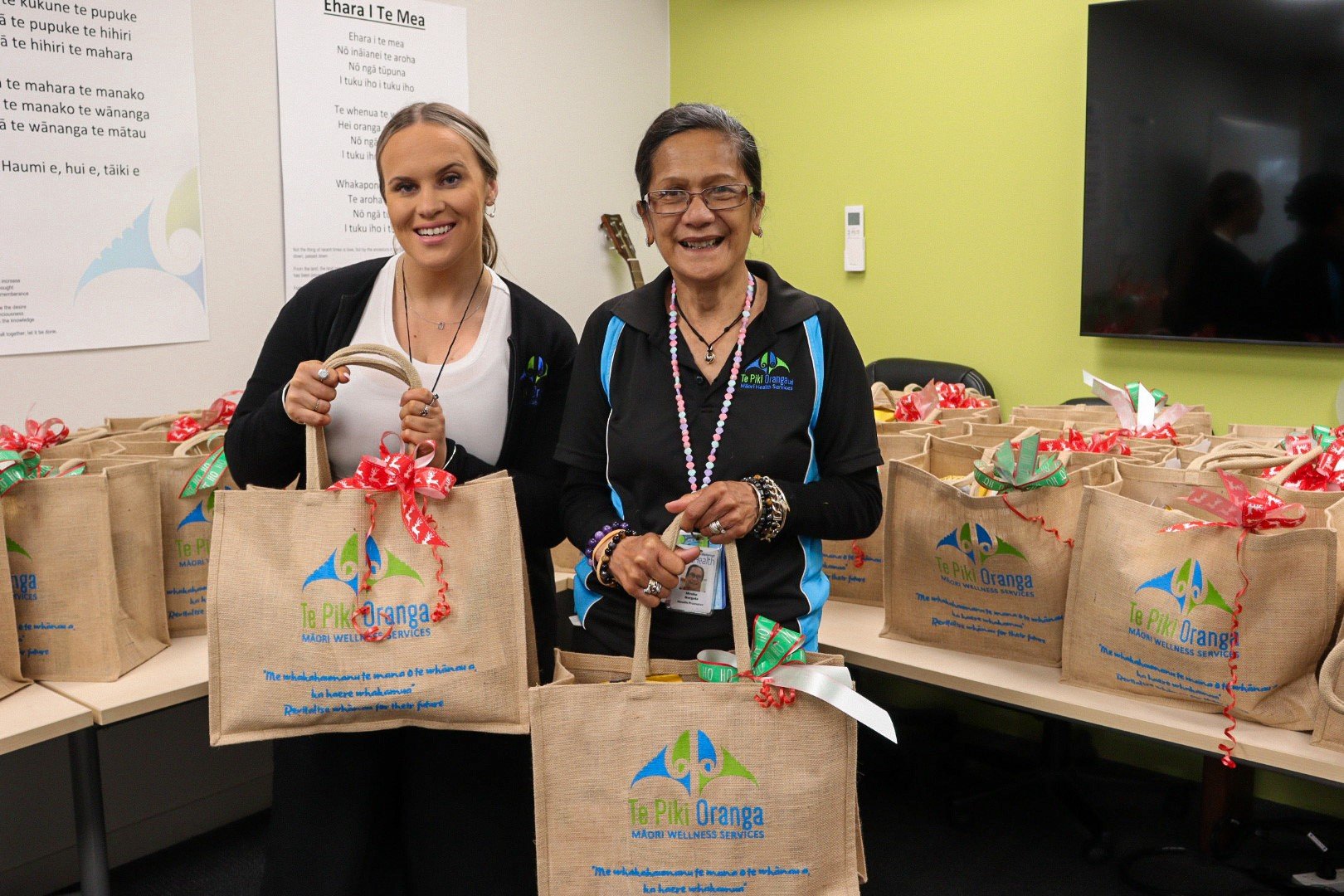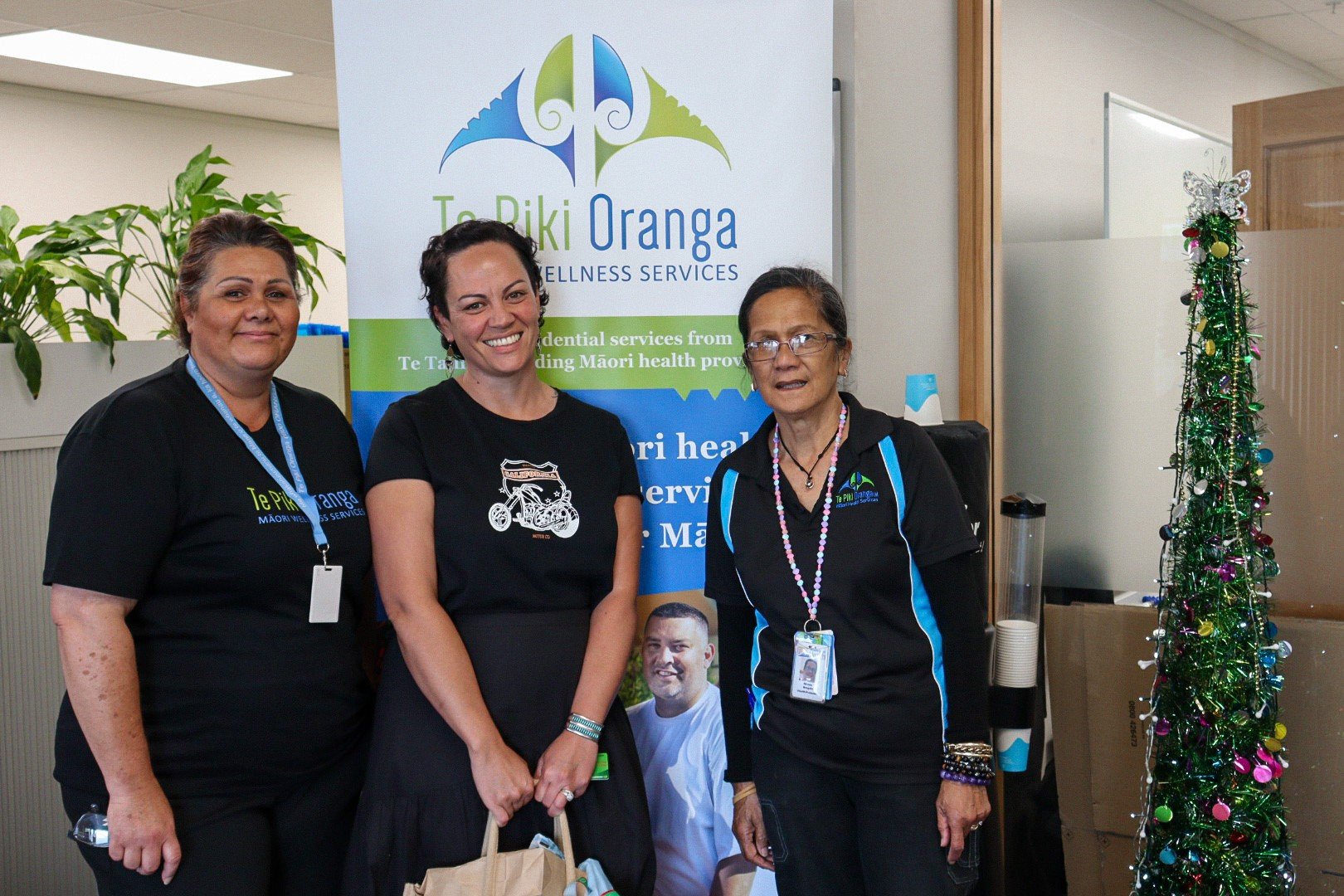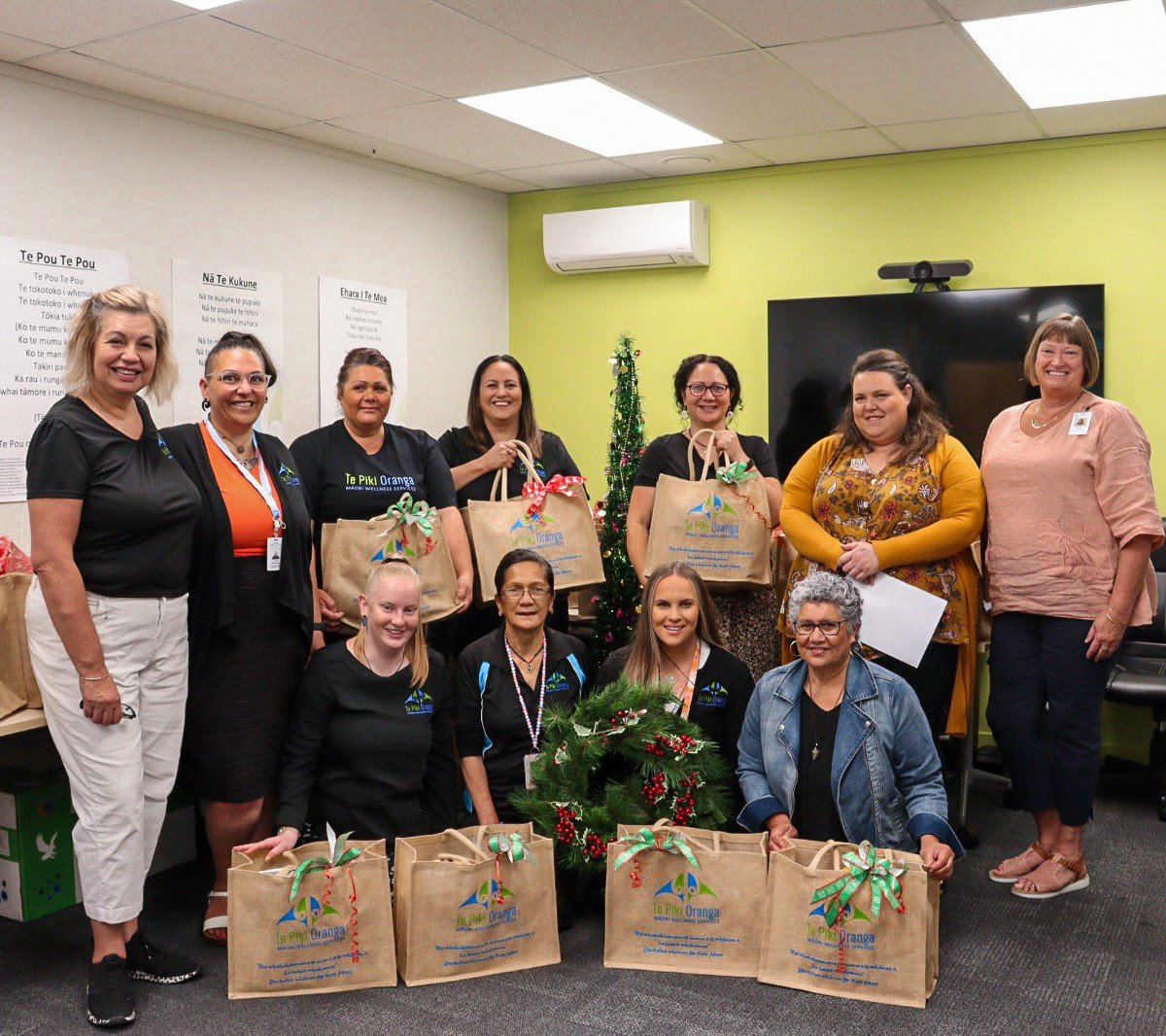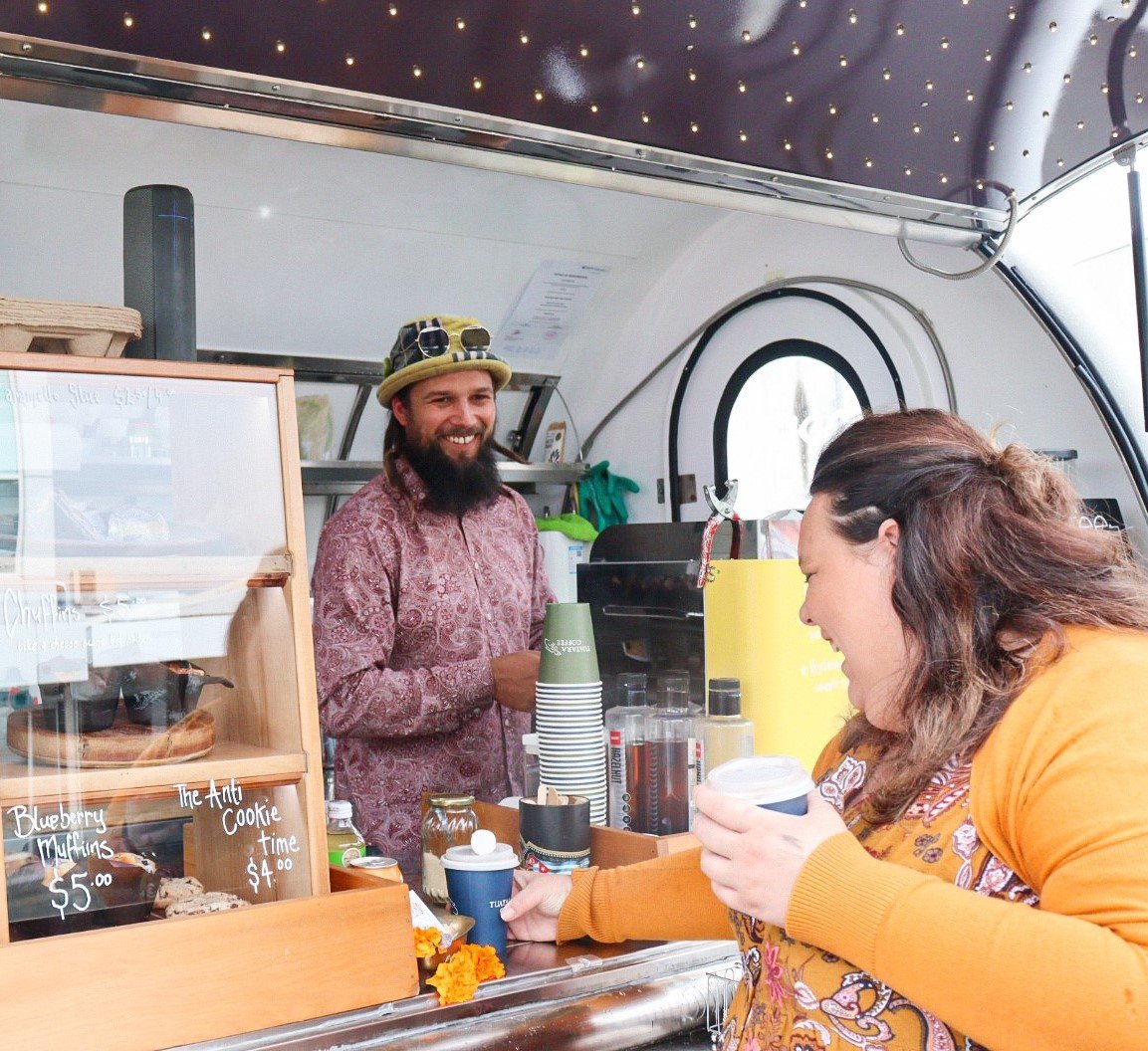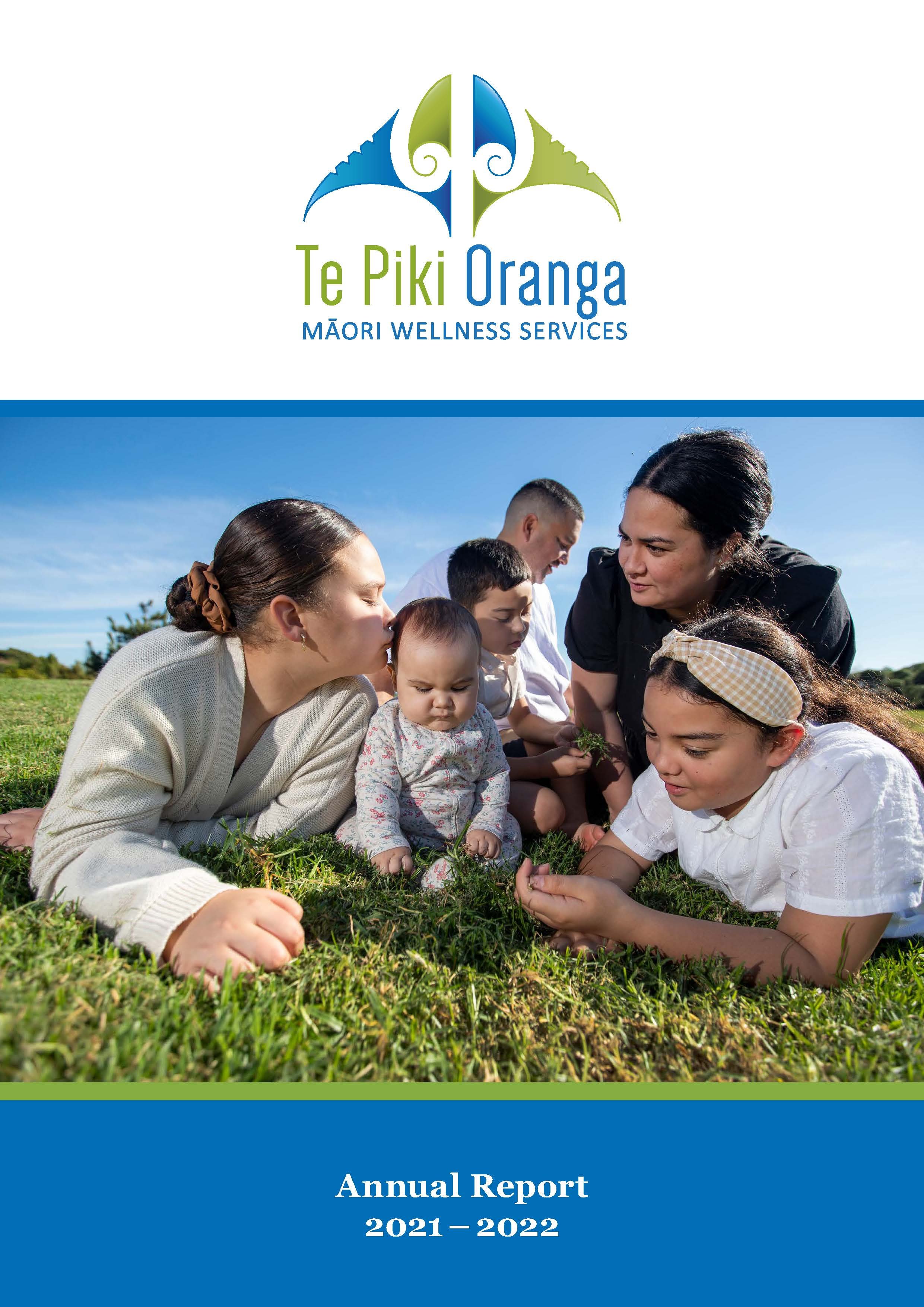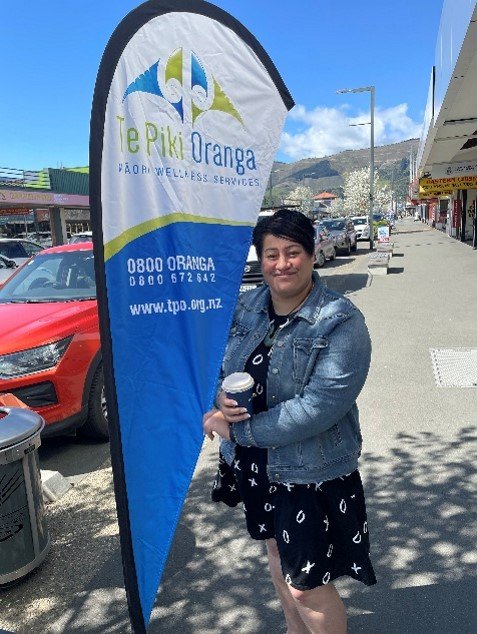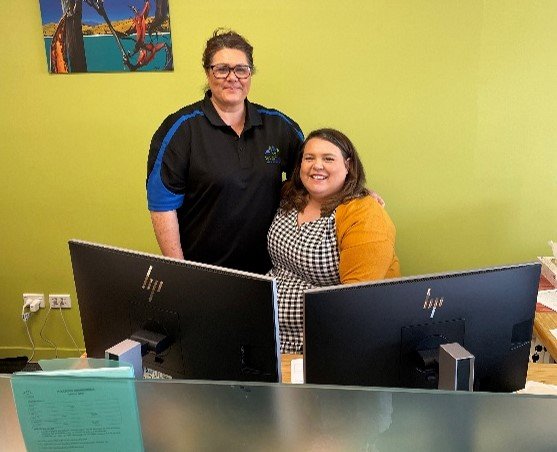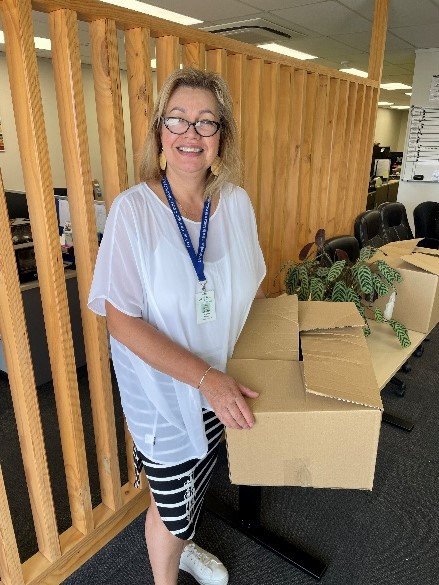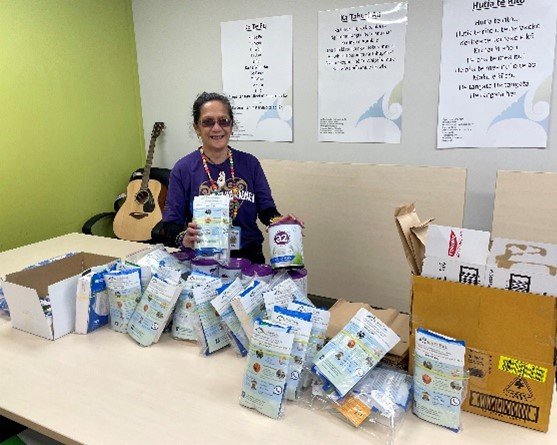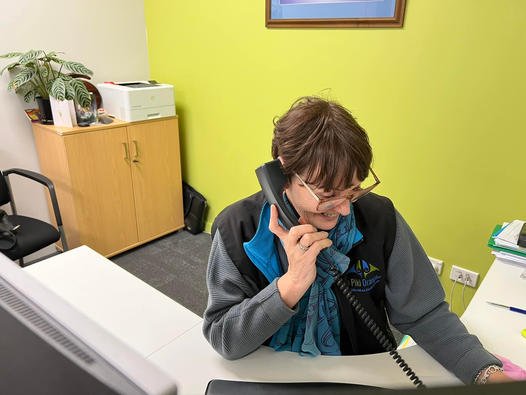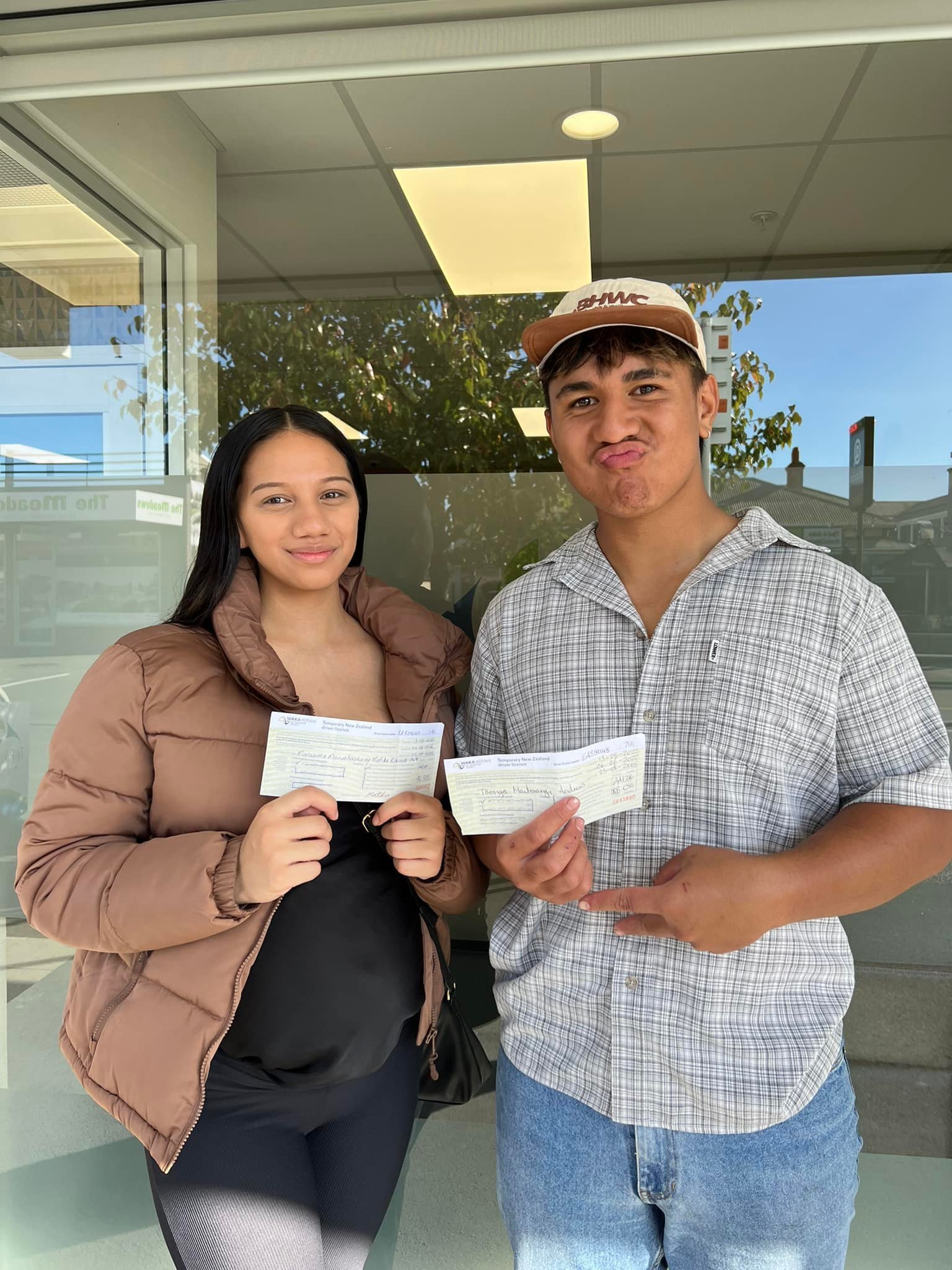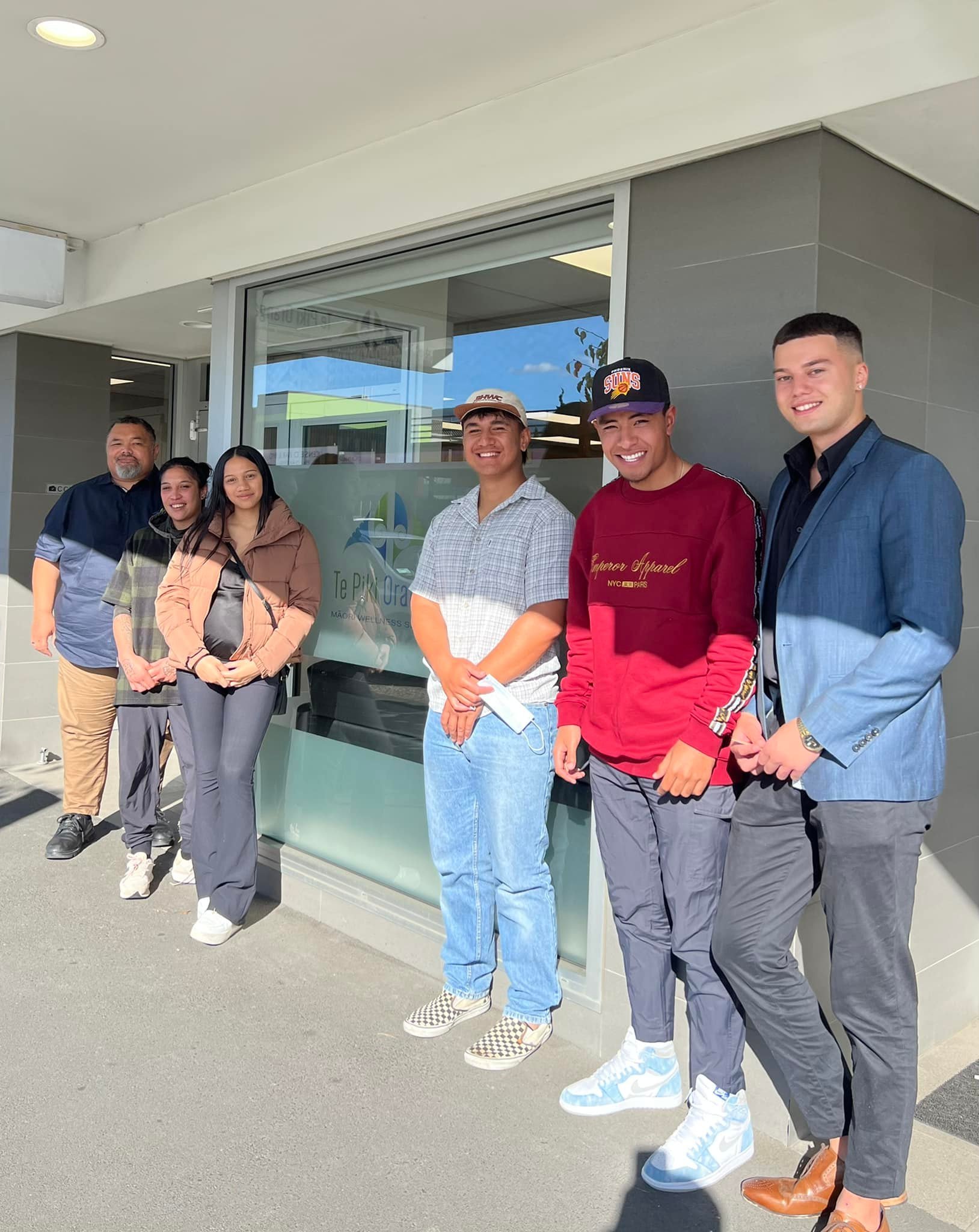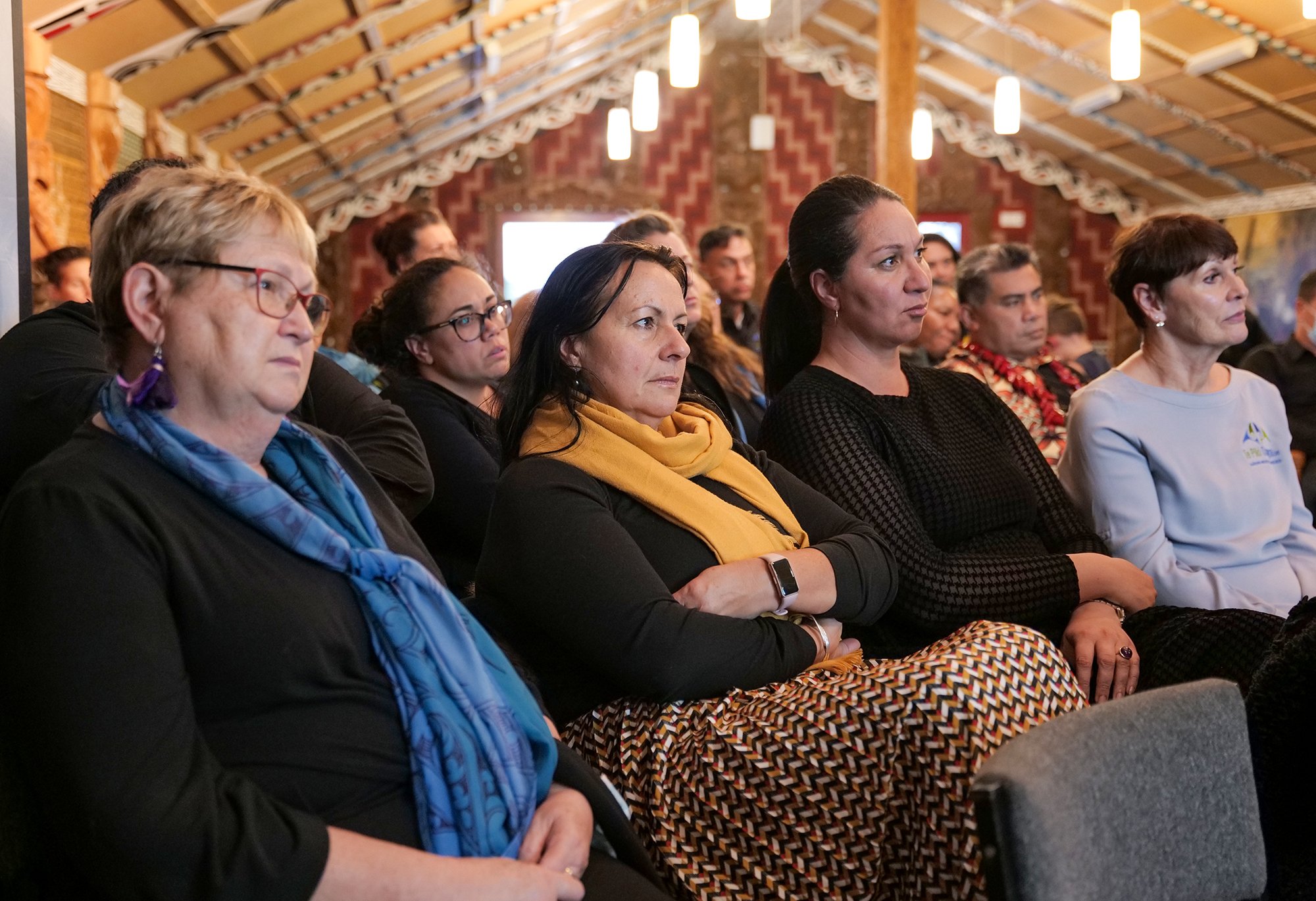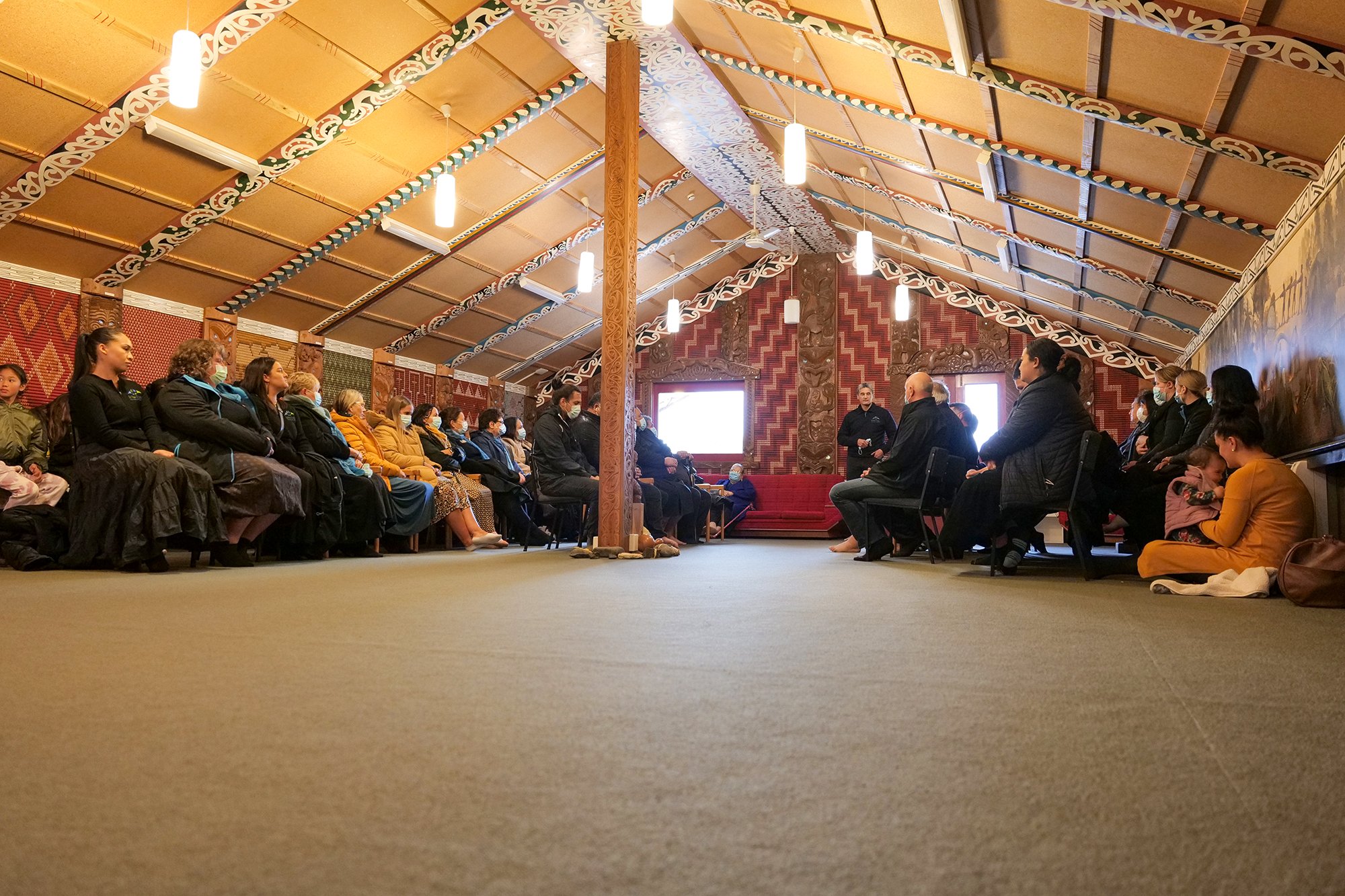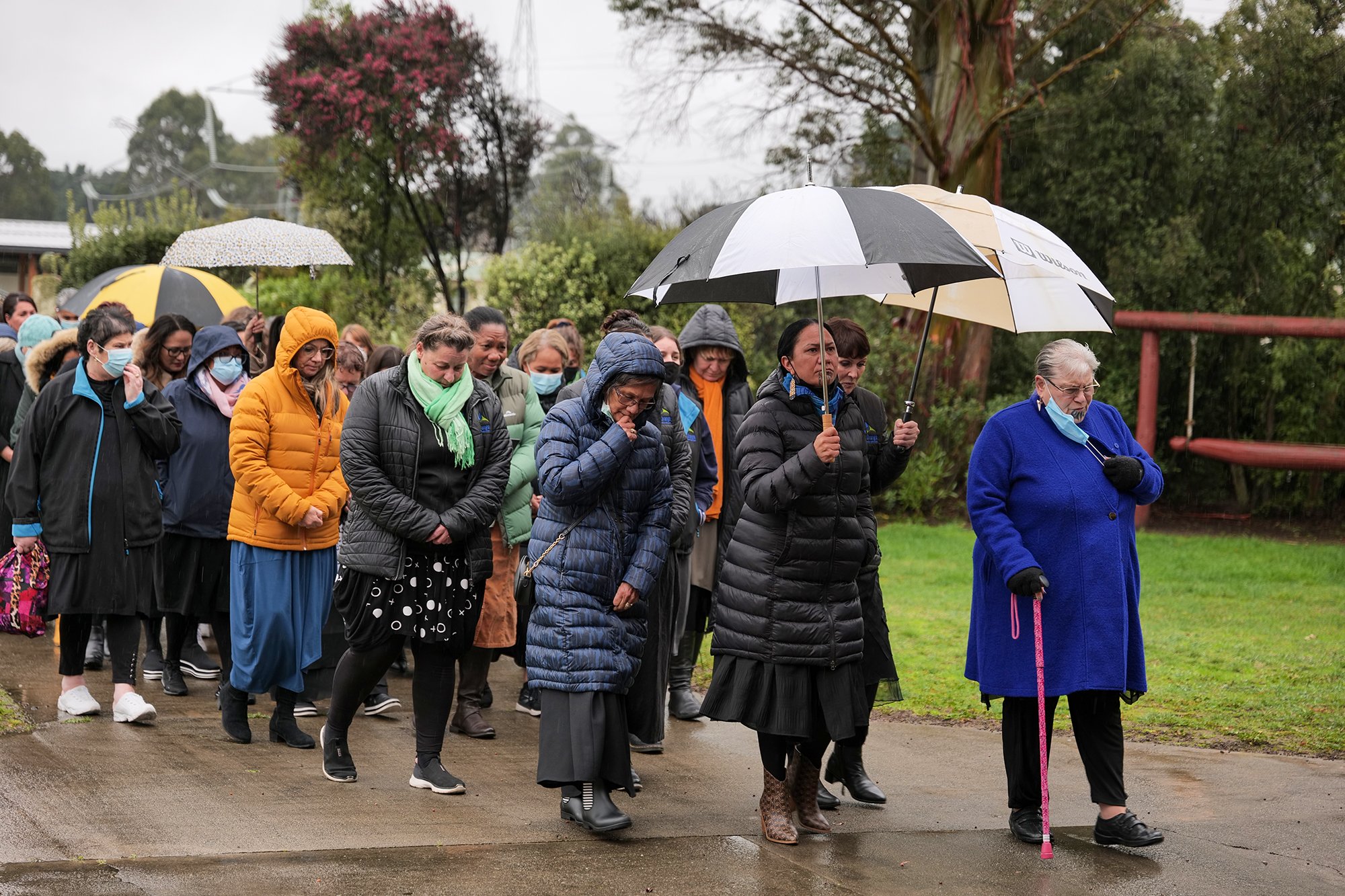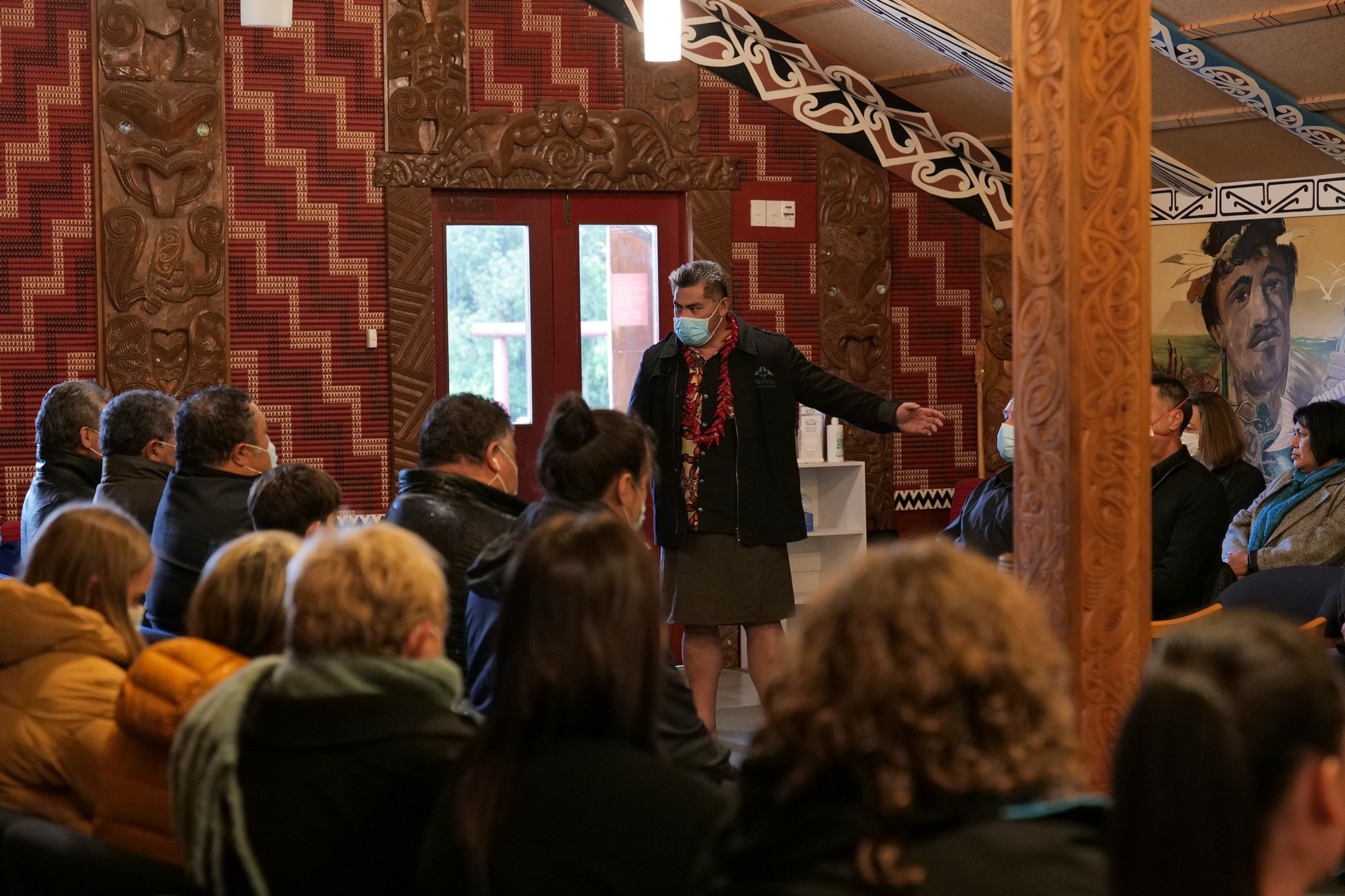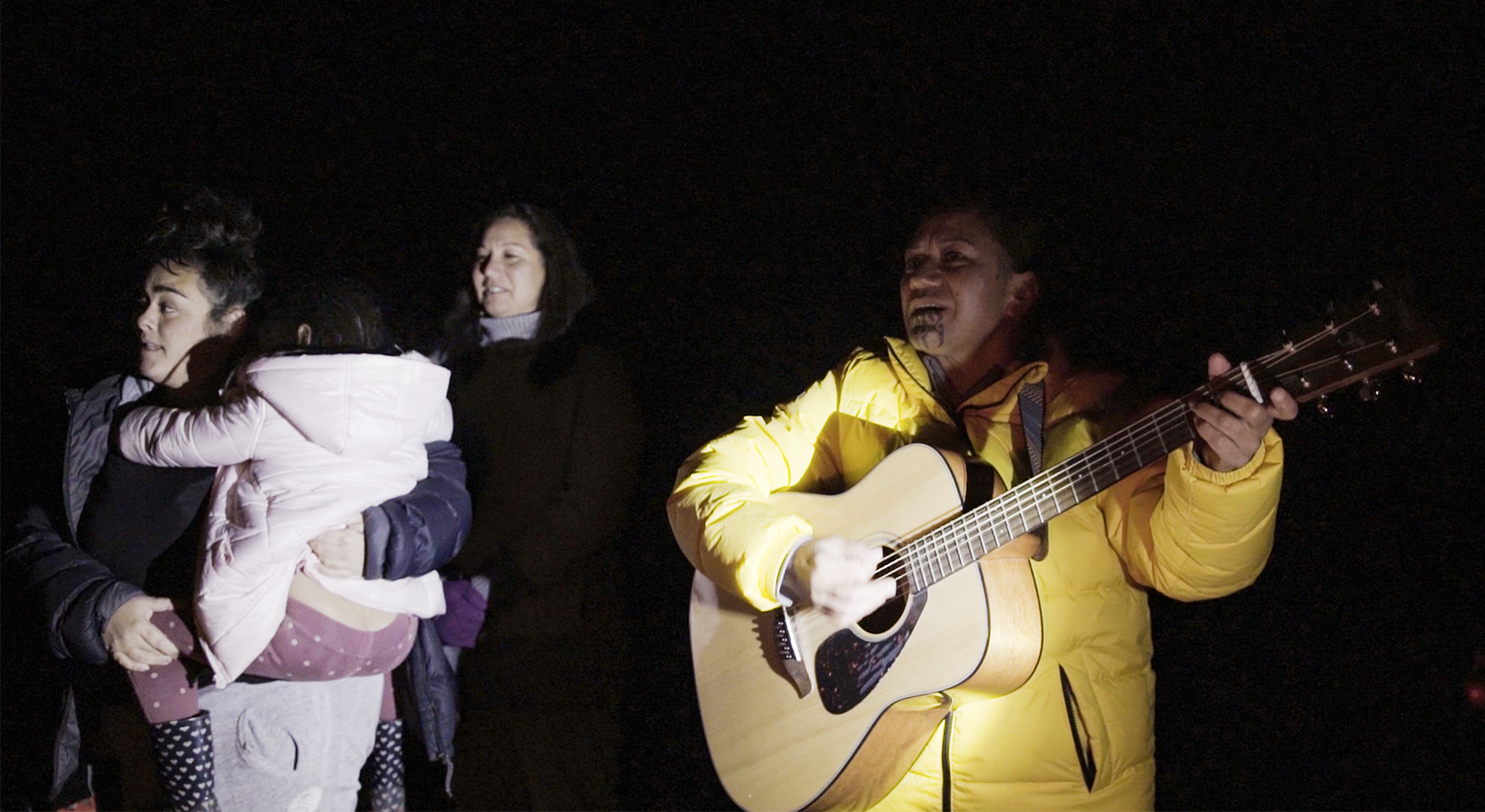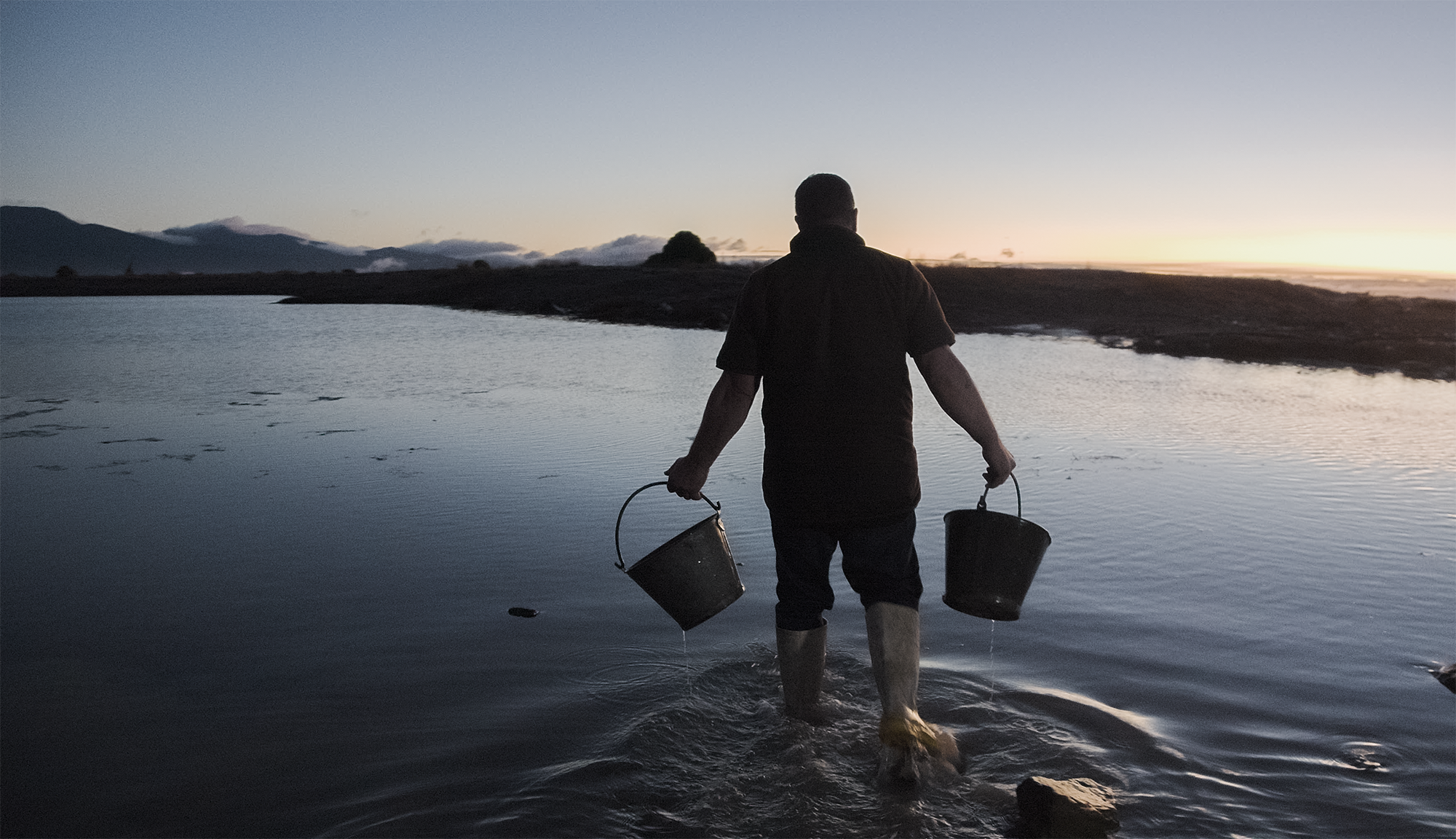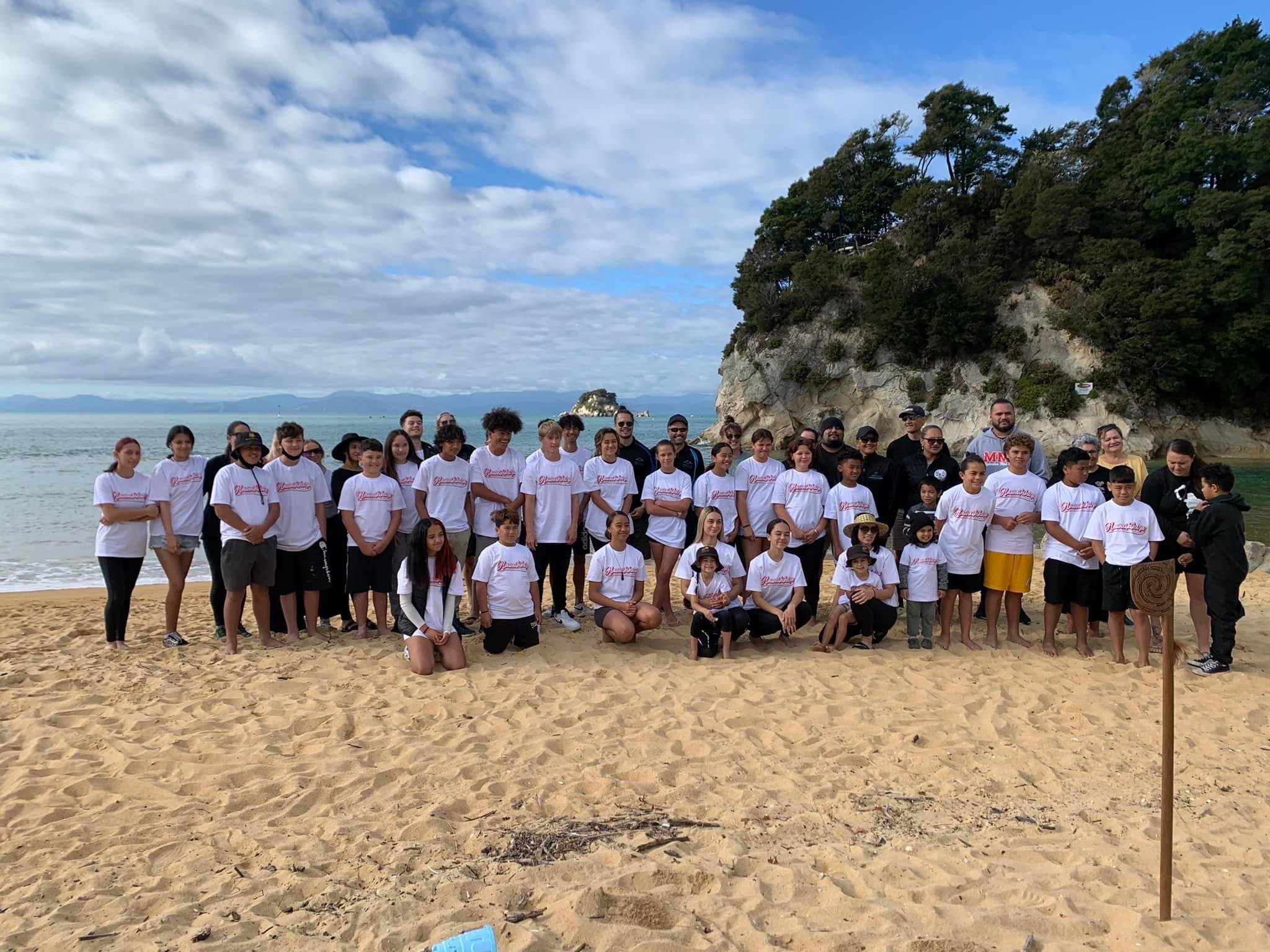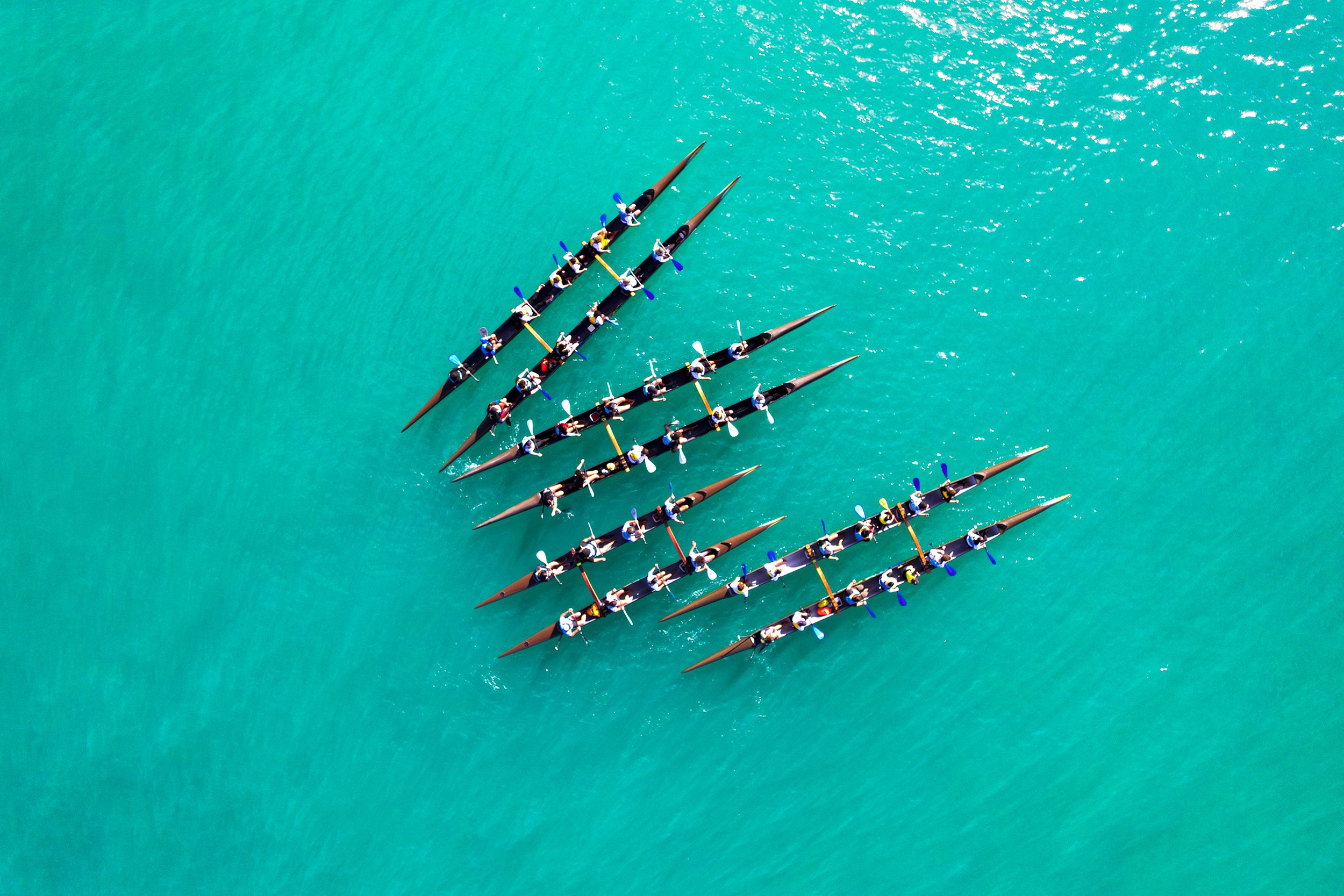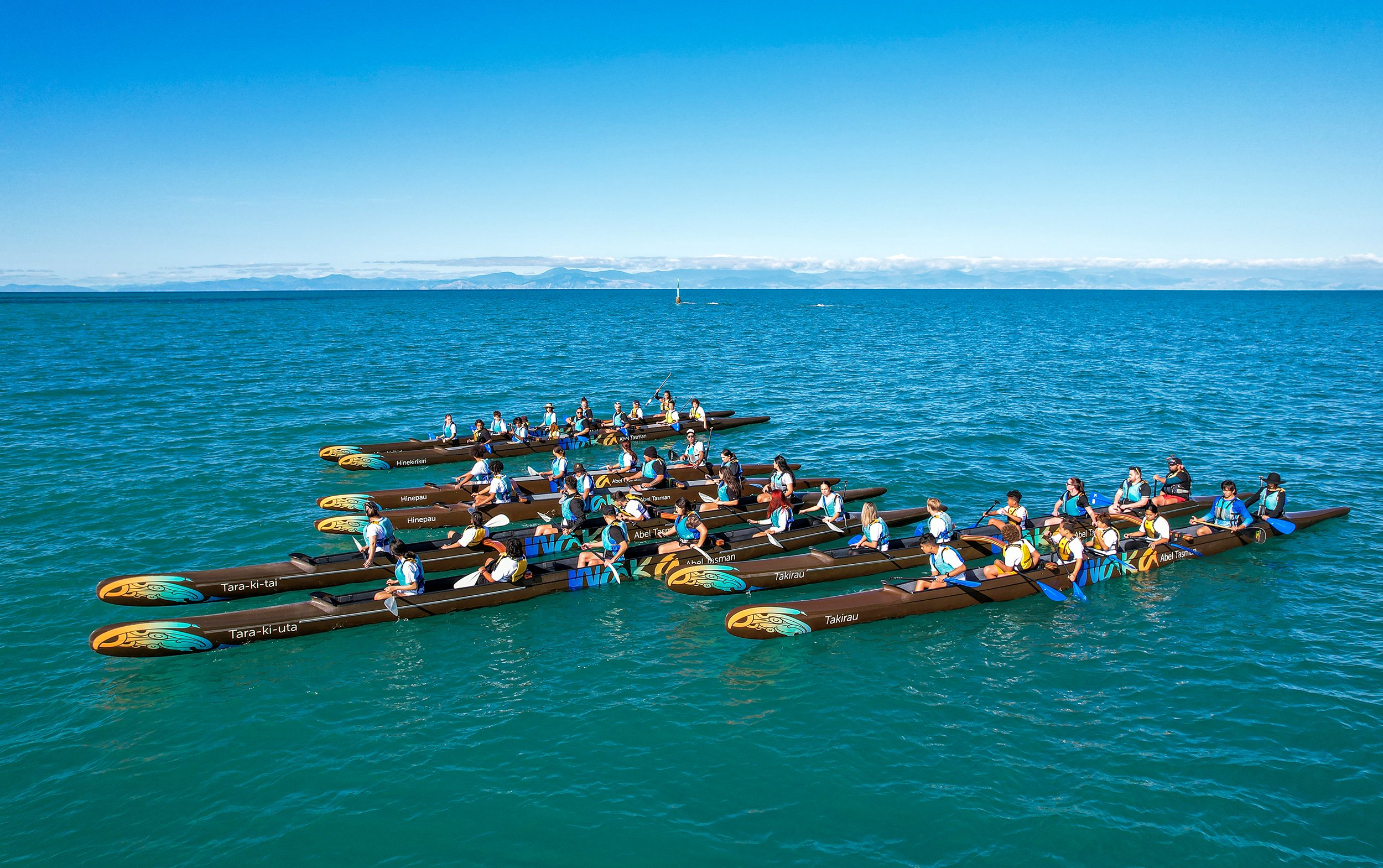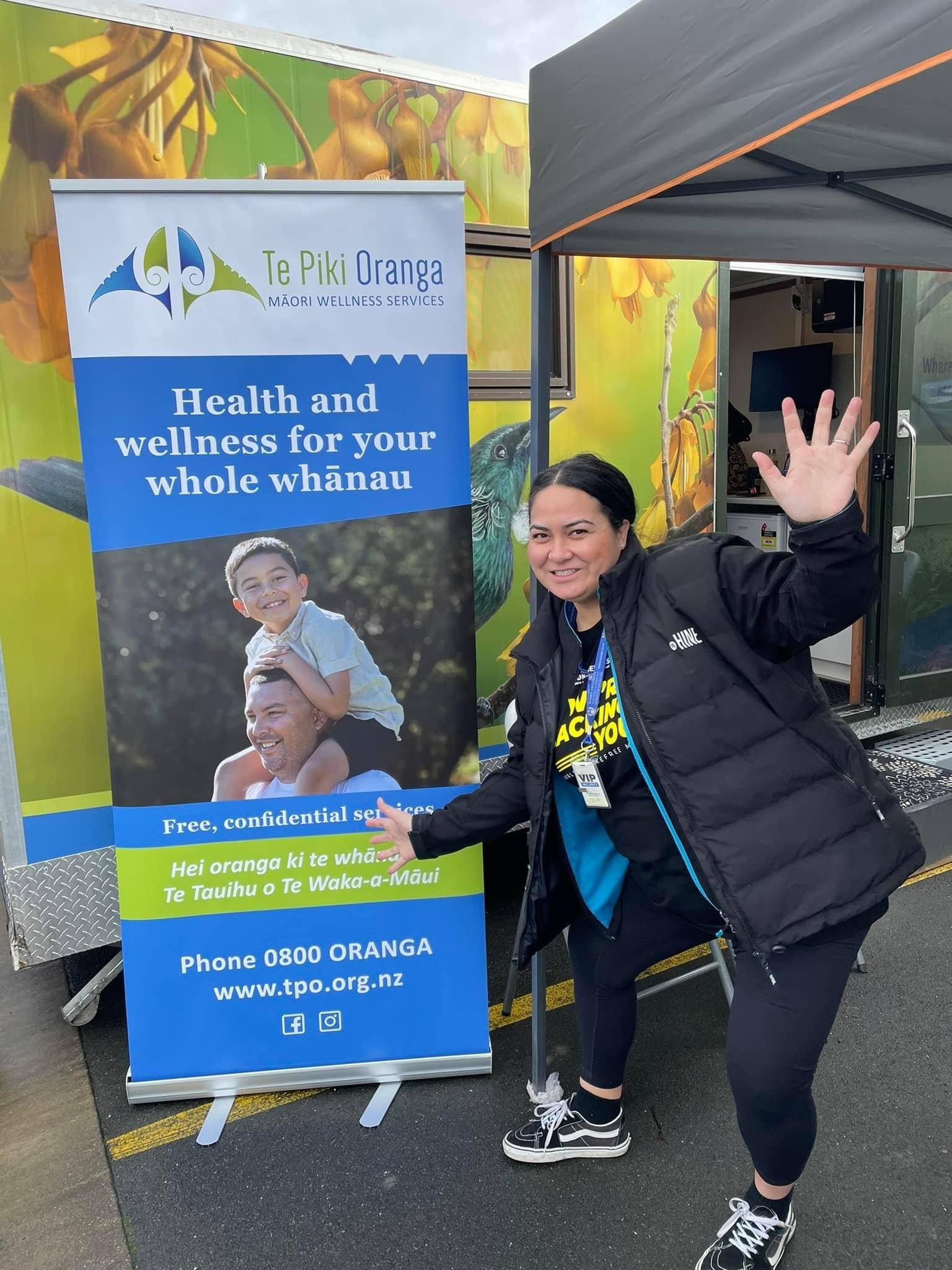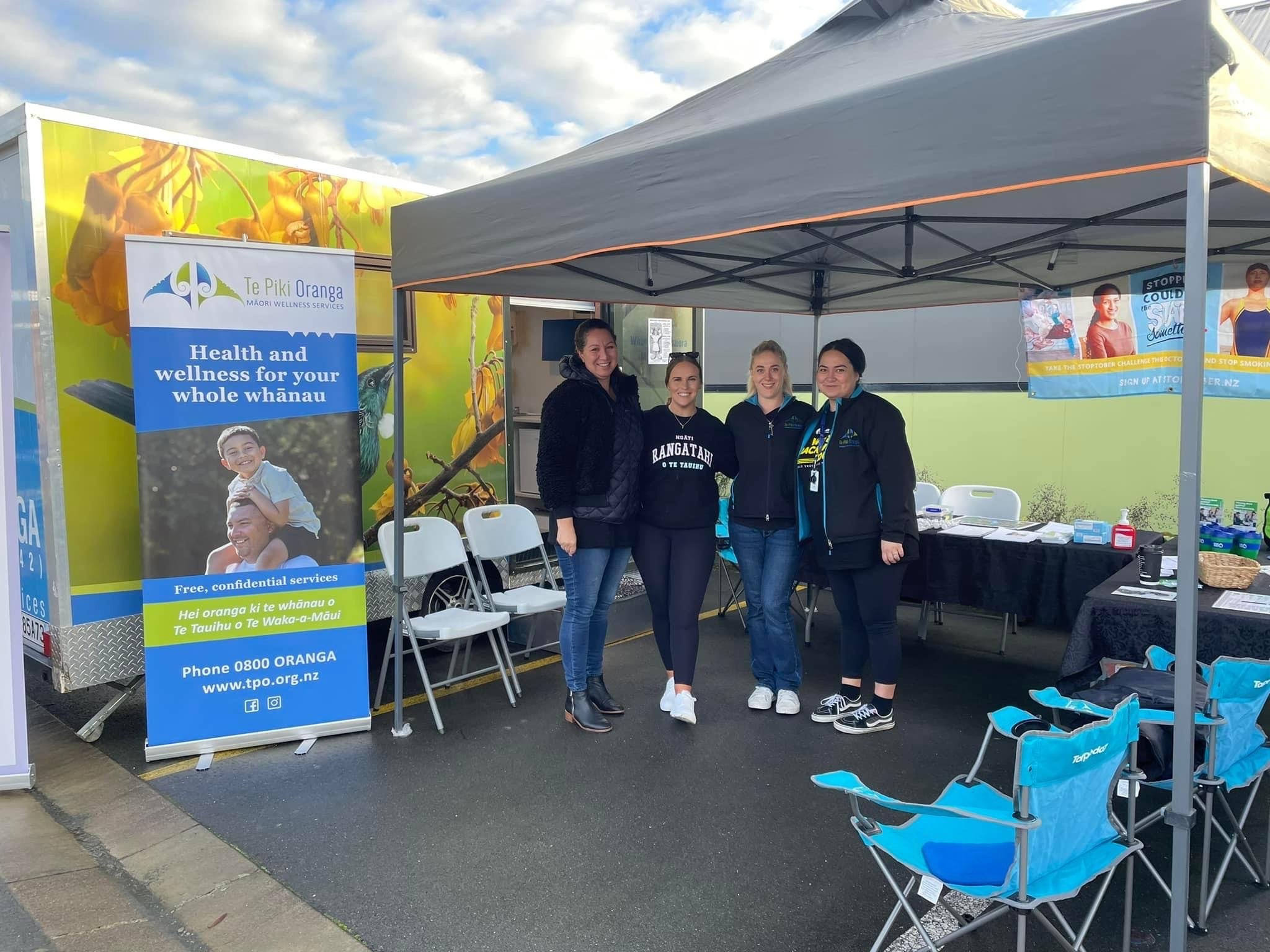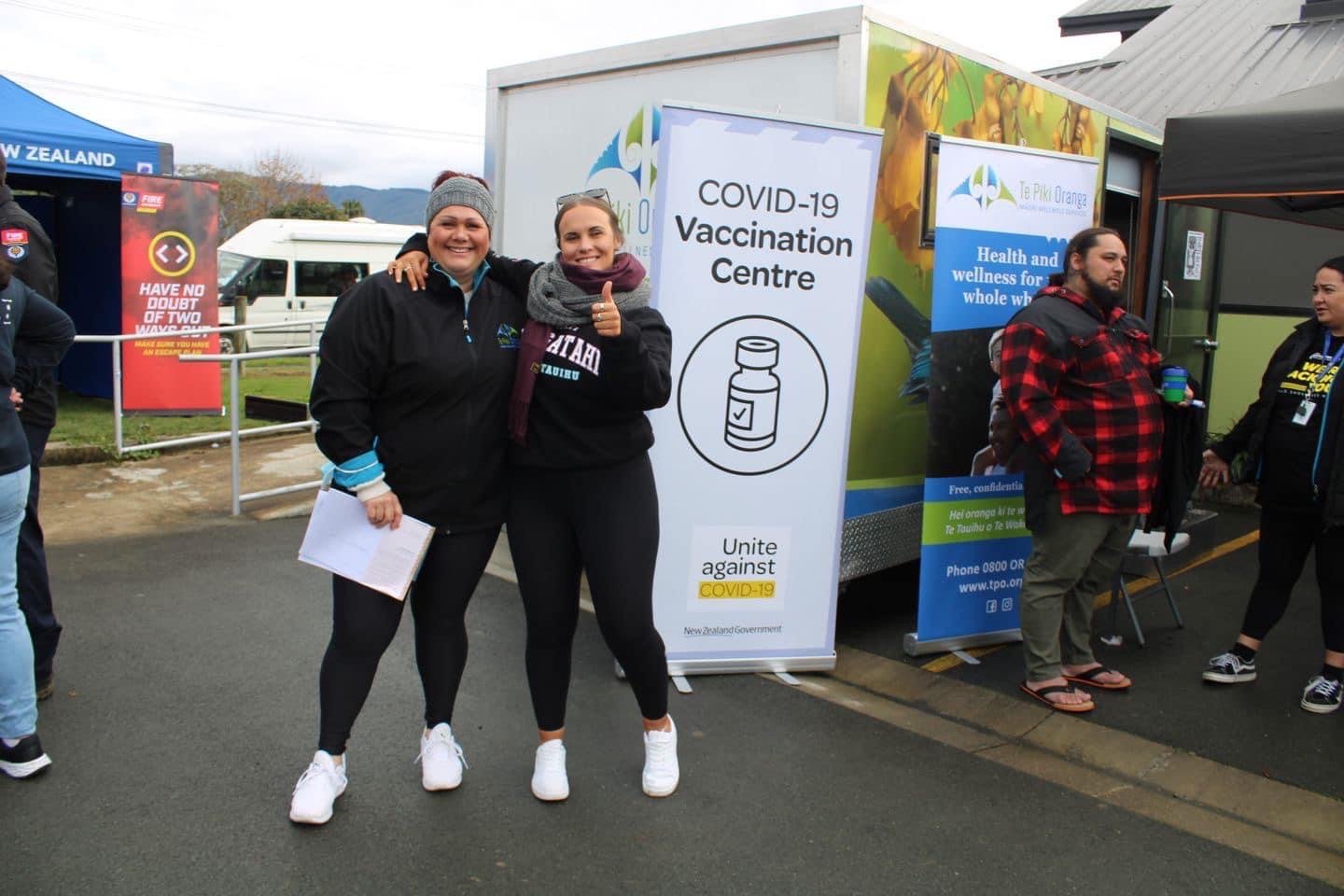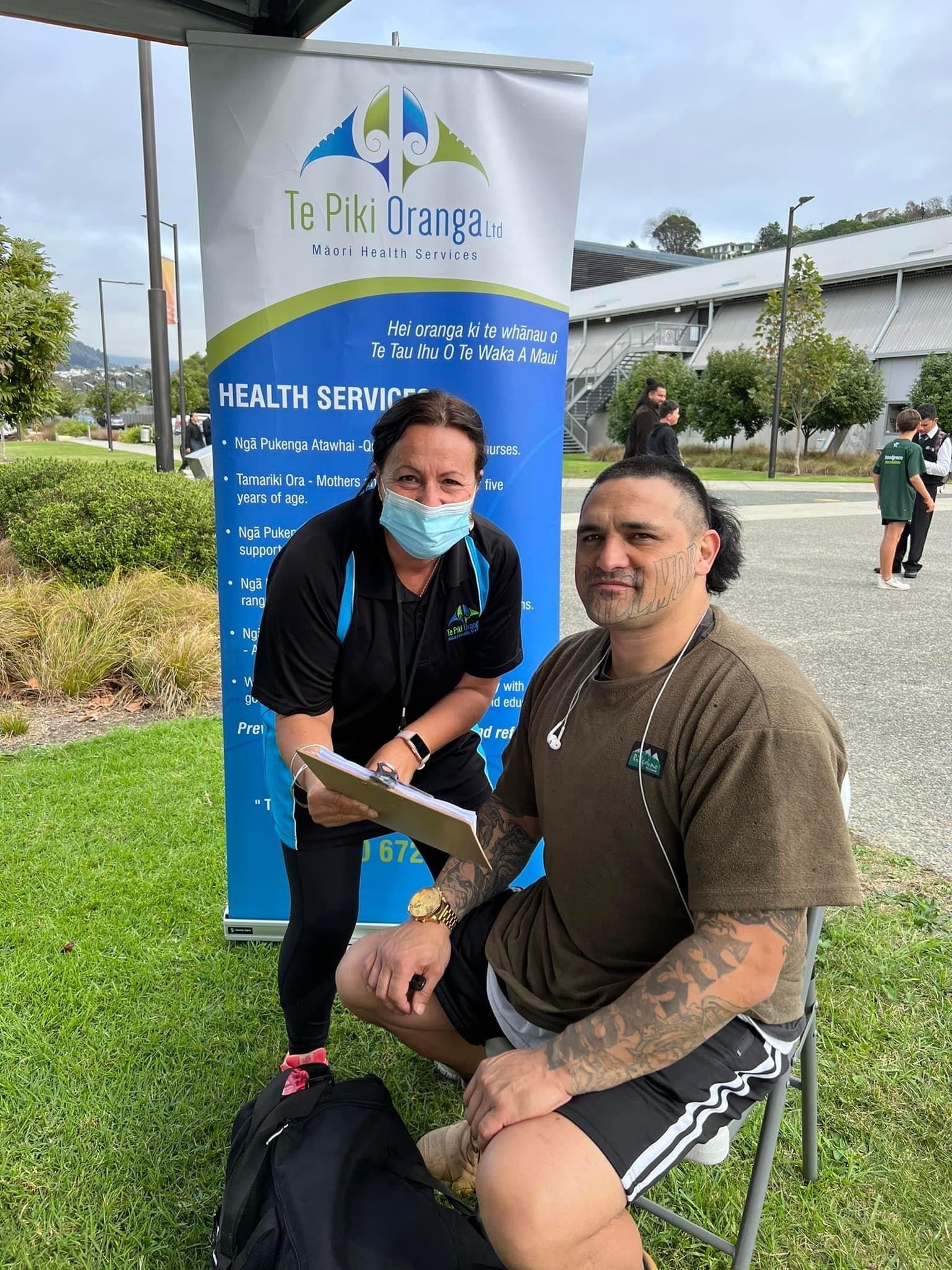Taking the time to get strategic
Taking the time to get strategic
A Te Piki Oranga Strategic Plan hui in November was a welcome return to the kaimahi development calendar after disruptions in the past two years due to COVID-19.
Held at the Hedingly Centre in Waimeha (Richmond), the hui was an opportunity for kaimahi to put their everyday mahi to one side for a while and focus on the big picture.
“The day was about where we are at and where we are going, in terms of our strategic plan, and a chance to ask questions and give feedback,” says Rachelle Tauroa, Te Ata Pūao Establishment Co-ordinator.
Guest speaker Riana Manuel, Chief Executive Officer at Te Aka Whai Ora, the Māori Health Authority, joined the hui by video conference. Another highlight was a presentation from Te Piki Oranga Management Team members Lorraine Staunton and Carl Baker about service Delivery wānanga held this year.
“We also had a ‘speed dating session’ with the Board of Directors and some of our head office management team. This was a fun way for kaimahi to get to know our leaders a little better, and ask any burning questions,” Rachelle says.
Less barriers to healthcare can lead to lifechanging results
Less barriers to healthcare can lead to life-changing results
A little manaakitanga – kindness – goes a long way when it comes to encouraging wāhine Māori to take steps towards better health outcomes.
For the Mana Wāhine clinics run by Te Piki Oranga, this kindness comes in the form of free transport, an alternative home visit, or the kind of kōrero about a procedure that you won’t get in a routine 15-minute GP appointment. And with the support of Sealord in a unique Te Tauihu partnership, the manaakitanga can flow a little more freely.
As the leading provider of kaupapa Māori health and wellbeing services in Te Tauihu (top of the South Island), Te Piki Oranga reduces inequitable health outcomes by providing high-quality and accessible services that are consistent with the concepts of whānau ora and tino rangatiratanga (self-reliance and independence).
The Mana Wāhine clinics are one of many innovative approaches Te Piki Oranga takes, that place whānau at the centre of care. Lorraine Staunton, Kaiwhakahaere Ratonga, Service Delivery and Operations Manager, is looking forward to seeing the seeds sown during the clinics start to bear fruit in the months that follow.
“One of the main reasons we need Mana Wāhine is to improve cervical screening rates and reduce inequities for wāhine in our rohe. Some women are 15 years overdue for their screening through no fault of their own – sometimes it just takes a little manaakitanga to help overcome barriers to healthcare.
“We will offer transport, a ‘no obligations’ conversation with a nurse or we will take our mobile screening service to a woman at home where she feels less worried or scared about the procedure,” Lorraine says.
With more than 350 wāhine Māori in Te Tauihu due or overdue for cervical screening at the time of the first clinic in September, Te Piki Oranga made a critical difference by supporting 40 wāhine to be screened on the day or booked for another time. At the second clinic in December, 40 women were screened and four booked for screening at another time.
“Mana Wāhine goes deeper than screening however, and our time with wāhine is valuable so we also take the opportunity to check for other unmet health needs.”
The December clinic proved an invaluable conversation starter about health and wellbeing. Wāhine, and in some cases their tamariki, were referred to services including: breast and bowel cancer screening, Stop Smoking Services, counselling, immunisation, Well Child Tamariki Ora nursing, social workers, midwifery services and more.
“The benefits from a holistic, one-stop approach like this can continue for months after a clinic – and that’s what we aim for in healthcare,” Lorraine says.
Te Piki Oranga has been able to cover travel costs for whānau with funding support from Sealord – a partnership that fits with the seafood company’s ethos of putting people first, says Sealord CEO Doug Paulin.
“Sealord is half-owned by Māori and 15 per cent of our employees are Māori,” Doug says. “It’s important to us to support our people’s whānau and their communities, and this is making a real difference.”
The three-year agreement improves access to healthcare for whānau and also means that Te Piki Oranga kaimahi do not have to take as much time away from their main mahi to drive whānau to important appointments.
Lorraine says that Sealord’s support is helping to bridge a critical gap.
“Achieving better equity in healthcare starts with reducing barriers where we can – even more vital during a cost-of-living crisis where some whānau are prioritising paying the grocery bill over their own healthcare needs.
“When you need to attend a dialysis appointment three times a week, and rely on taxi transport to get there, this can be hugely stressful.
“With Sealord’s support we are able to strengthen and empower whānau for better health outcomes,” she says.
Lorraine says the collaboration between Te Tauihu health and social services made the kaupapa a success. Te Kotahi o Te Tauihu contributed iwi liaison support, and kai for the Christmas kai hampers. Nelson Bays Primary Health Organisation’s Director of Nursing Bobby Hutton supported the cervical smear team. Te Whatu Ora Public Health contributed with health promotion activities and National Cervical Screening Team support. And Countdown Stoke gifted a $100 grocery voucher for a prize draw.
Sealord CEO Doug Paulin and Te Piki Oranga Tumuaki (General Manager) Anne Hobby
Photos from the December Mana Wāhine clinic
Clockwise from the top left photo:
Kaimahi Amber Ford and Miraka Norgate
Kaimahi ready to greet wāhine to the clinic
Kaimahi with Kirihimete whānau packs to welcome wāhine to the clinic
Wāhine were offered vouchers for a coffee break during the clinic from Baba Yaga’s coffee cart.
Reflecting on the past year with the 2021-2022 annual report
The Te Piki Oranga annual report for 2021-2022 year is available to read online, or download and print.
The annual report includes:
insightful forewords from Chairperson Jane de Feu and Tumuaki Anne Hobby
Board of Directors’ karere
photographs of the Te Piki Oranga management team
enrolment and service highlights
whānau demographics
kaimahi development and highlights
hauora Māori partnership success stories
financial reports
auditor’s reports
Mana Wāhine clinic success
Mana Wāhine clinic success
More than 350 wāhine Māori in Te Tauihu are either due or overdue for their cervical smear check, something that Te Piki Oranga has set out to address.
With the support of Nelson Bays Primary Health, Te Whatu Ora Nelson Marlborough Public Health, Te Kotahi o Te Tauihu, the Cancer Society, Sealord, and Te Whatu Ora, Te Piki Oranga held a one-day screening clinic in Whakatū called ‘Mana Wahine’ in late September.
The ‘by wahine for wahine’ clinic provided a safe and comfortable space for wāhine to get their cervical screening and to get support for other health concerns. 40 wāhine were screened, 11 were booked for another time and more than 80 per cent of all participants were wāhine Māori.
Conversations about other health concerns led to multiple referrals for services such as breast screening, endoscopy, Healthy Homes, B4 School Checks (for tamariki), navigation support for Oranga Tamariki and Te Hā quit smoking services. Dr Ricki-lea Aitchison, a Māori GP from Mapua Health attended the event to answer wāhiin pātai and concerns pertaining to the smear or other issues.
Transportation was provided, as some wāhine travelled from Te Hora Pa, Motueka, and Brightwater, and each wahine was gifted vouchers and a generous kai pack upon leaving.
The uptake and feedback from those that attended the day was very positive and planning is underway for the next Mana Wāhine event in November.
Special thanks to our health partners and sponsors for helping to make this event a success.
Awhi aplenty for flood-affected whanau
Awhi aplenty for flood-affected whanau
Lorraine Staunton, Kaiwhakahaere Ratonga (Service Delivery and Operations Manager) managed Te PIki Oranga’s response during the worst of the severe weather event in Te Tauihu in late August.
Lorraine coordinated the team as they placed 1,336 calls to whānau who were evacuating or potentially affected by flooding.
Anne Hobby, Tumuaki (General Manager) checking in with whānau
The first step was to know who to call, made easier with the support of Te Whatu Ora - Health New Zealand - Nelson Marlborough data analysts who provided maps indicating the location of whānau in flooded areas.
"We were provided with lists so that we could call our whānau who were enrolled or had previously been enrolled,” Lorraine explains. “We had a team working for four days making calls, right through the weekend. We had a team in Wairau, Motueka, and Whakatū. We wanted to provide the lists by region because our people know those areas geography-wise because the questions they might get from whānau would be more common to them.
“Often whānau were being called at the time they were actually packing to evacuate so we talked through their plans and saw if they needed some support that we could offer them. For example, they’d say, ‘we’re going to our mum’s. There’s five of us, our mum’s got a little place and no food.’ We were able to have food ready for them by the time they got to their mum’s. They were just really relieved, it was one thing they didn’t have to worry about.”
Closed roads, increased traffic, and heavy rains meant that many were unable to go to pharmacies for time-sensitive, specialised medications. To combat this, Te Piki Oranga sought emergency authorisation to be able to collect medications on behalf of whānau by working with doctors and pharmacists.
To deliver medication and kai, Te Piki Oranga contacted Civil Defence and provided them with the specific needs of each whānau. If the household was in a closed-off area, kai and medication would be delivered via helicopter. However, having that initial first contact with a familiar organisation meant a lot to those who received the calls.
“A lot of it was reassurance and psycho-social support that we were able to give them over the phone. We made it clear we were coming from a health response, but we were able to connect them to the other support that they may require, like Civil Defence.”
For longer-term, less immediate kai needs, Te Piki Oranga referred whānau to the charitable organisation Te Pātaka, food banks, or other relevant service providers.
In addition to providing immediate support, the calls were a good chance for Te Piki Oranga to connect with whānau who had not been enrolled for a while and had new health needs.
Brenda McQuillan, CAMHS
“Other conversations that came out of the calls were in regards to other health worries they had. They had us on the phone already so they were able to say ‘hey, I’m really worried about my teenager,’ for example, and we were able to refer them to our CAMHS team for follow-up.
“The reconnection was really good. People were grateful for the calls – ‘oh man, you guys are cool, thank you for thinking about us.’”
In addition to directly calling whānau, Te Piki Oranga also kept in touch with the community via their social media channels during the worst of the weather event. Kairukuruku Whakapā (Communications & Telehealth Co-ordinator) Grayson Nepia stayed on through the weekend, pushing out details on hand hygiene, road closures, and boil water advisories. To these messages, Grayson added Te Reo and the friendly tone their audience is familiar with.
Lorraine says that going forward the flood response experience “added to the knowledge for our kaimahi that there will be fallout from the flood response in regards to the continued support that is needed. This morning, I sent an email out to our staff about the pharmacy closures and short staff so that they are aware of the challenges whānau will have. It’s not just the flood, it’s obviously sickness as well that’s caused changes in the community.
“Going forward we’re continuously informing our staff to be able to inform whānau they are working with about any updates or services that could be valuable and needed to provide support.
“I am really proud of our organisation for stepping up and doing what they needed to do at such short notice and between our COVID response and all of the other high-needs things that we do. I’m proud that we were able to respond the way we did. It was a great collaborative approach to supporting whānau in this time of need.”
Realising potential: A CAMHS success story
Realising potential: A CAMHS success story
By John Hart – Wairau CAMHS/Mental Health Navigator
Little did I know on first meeting with this young blue eyed blonde hair cheeky Māori boy what an impact and how he would grow on me.
My first memory of him is while playing basketball was that he wanted to punch me in the face I roared at him "surely in gest” he just looked back at me confused.
We played basketball twice a week sometimes for 3 hours a day, one v one B-ball so he could claw back some of the points I would fluke against him. Little did he know at the time from early on I could see he had determination but no focus or work ethic towards training.
He had fallen through the cracks of mainstream education system with very little to no chance of getting back in the school gates. In his own words lately, he was just in need of some structure and routine and for others to just understand how he processed everything.
From an Xbox influenced lifestyle of Grand Theft Auto and bad choice of mates he started out in boxing and basketball to establish direction and focus. He started in alternative education program after being out of school for a couple of years and not fitting in mainstream system. he participated with Dawn Chorus in Picton as well as mentoring at Te Piki Oranga. He trained 4 to 5 times a week at Kai Toa Gym/boxing gym as well as weights at the gorilla pit at the stadium plus regular 5 km runs. He then jumped headfirst into the cactus program winning a trophy for being positive having leadership skills as well as encouraging others among other qualities.
He had started to mature and not needing to follow like before, becoming a leader amongst his peers. He now understood it's not about making people like him to make friends .It was about liking himself and becoming the best version of himself in the knowledge that others will like him too. With new career path choice and a heavy training regime and new goals he had found his new groove.
A new boxing coach additional positive mentors and support from whanau and new friends in his life. With new life experiences and goals and playing Basketball with a passion he walked onto the court with a red top on ,once upon a time that would never have happened as red was a forbidden word in his vocabulary. This was the moment when I thought he had reached the pinnacle and things couldn't get better. We played basketball on a Wednesday night with a loose collection of kids who like the game didn't have much to do mid-week. He walked onto the court like a Giant with the glow of an NBA player.
Learning to dive and hunt, shooting a deer, nutrition advice, shredding pounds to make weight ready for his first fight in the ring. From that date on and clocking up another 4 fights and 5 silvers later. His next goals are to finish the dingle foundation program this year and join the military next year 2023.
He has come a long way from fight club to a role model, we are all proud of him.
He Tangata
By Emani Soane, He Tangata kaitiaki (driving instructor)
For the last two years I have been able to take whānau for their driving lessons in the evenings and during the weekends. I was very fortunate enough last year to get my endorsement to become a qualified driving instructor with the support of Te Piki Oranga and Nelson Police.
Since being involved in our mentoring programme, it has been solely focused on supporting whānau to pass their restricted licence and full licence. Our programme now offers a Road Code Support programme for the learner's licence as part of the He Tangata mentoring programme.
The true strength of our He Tangata driving programme comes from all our whānau who have participated in the programme.
Our lessons have ranged from full of laughter, high blood-pressure moments to the occasional near-accident. We've had a few tangi moments, whānau wanting to walk out, and whānau carrying a lot of mamae.
By using Kaupapa Māori/Pasifika flavour to the lesson, whānau come to an understanding of the road rules when operating the waka, gaining confidence and taking pride in themselves. There is the opening up of employment opportunities for whānau, the privilege of listening to whānau kōrero about their life journey.
We tautoko whānau to access other Te Piki Oranga health services, share kai, walk alongside whānau when test results haven't gone our way and most importantly sharing in the celebration when our whānau pass their test.
Since the start of the year we have had 140 participants (84 Māori, 33 Pasifika, 14 European and 9 ‘unknown’), 191 lessons and 70 tests booked.
I would like to acknowledge all our Te Piki Oranga kaimahi that support our whānau and give them the extra push, encouraging them engage and show up for their lesson. A big thank you to Rachelle our administrator who books tests, orders birth certificates, keeps an eye on my calendar, sorts our referrals and all the background mahi she does.
Matariki 2022
Matariki marks the Māori New Year or Te Mātahi o te tau. The arrival of Matariki is a sign for people to gather, to honour the dead, celebrate the present and plan for the future. For our tūpuna, our Māori ancestors, astronomy was interwoven into all facets of life. Observations of the movements of the stars and planets, the changing position of the sun, the phases of the moon and the appearance of comets and meteors were recorded and handed down from generation to generation as part of Maaori oral tradition.
To celebrate Matariki this year Te Piki Oranga held a wānanga for kaimahi at Omaka Marae beginning on Tuesday 28 June with an afternoon powhiri, followed by three guest speakers, hākari and waiata. The next day starts early with a trip to Rārangi to observe Matariki.
The rōpu (group) returned to Omaka Marae to partake in a ceremonial offering known as Te umu kohukohu whetū me te hautapu. Hautapu is a traditional ceremony about making an offering to the Matariki star cluster. Kai from the four stars* are collected from their respective sources, prepared, and cooked and the steam is offered to them while the kai is consumed by the rōpu.
The nine stars of Matariki
Matariki – the mother of the other stars in the constellation
Pōhutukawa – connects Matariki to the dead and is the star that carries our dead across the year
Tupu-ā-nuku* – is tied to food that grows in the ground
Tupu-ā-rangi* – is tied to food that comes from above your head such as birds and fruit
Waitī*– is tied to food that comes from fresh water
Waitā* – is tied to food that comes from salt water
Waipuna-a-rangi – is tied to the rain
Ururangi – is tied to the winds
Hiwa-i-te-rangi – is the youngest star in the cluster, the star that you send your wishes to
Tihei Taiohi: A different approach!
Lining up and talking to health experts is not every rangatahi’s idea of a good time, but in a fresh approach to hauora the conversations have been flowing.
Thirty tamariki and rangatahi, many with their whānau, gathered at Kaiteretere in the beautiful Abel Tasman National Park on Friday for an event aimed at not just talking about health, but providing youth with an opportunity to connect to te ao Māori, mātauranga Māori and a more holistic view of issues that might be affecting young people’s health.
The wānanga, named Tihei Taiohi, was a collaboration between cultural development experts Hawaiki Kura, Whānau Ora commissioning agency Te Pūtahitanga o Te Waipounamu, Māori primary health provider Te Piki Oranga and Te Kotahi o Te Tauihu Trust.
“It’s a fresh approach to talking about some of those issues that are out there,” says Lydia Mains, clinical co-ordinator with Te Piki Oranga.
“Teaming up with Hawaiki Kura has helped us enable that, and in a way that is fit-for-purpose and which suits our people.”
Hawaiki Kura are well known for delivering rangatahi empowerment and cultural development wānanga throughout Te Tauihu and their innovative wānanga are popular among rangatahi. The event on Friday was a family effort, with teenaged sisters Te Ao Mārama Nepia and Māreikura Nepia delivering the wānanga, supported by their father Kiley.
“Our wānanga are all about reconnecting our rangatahi to te ao Māori and promoting holistic wellbeing,” says Te Ao Mārama Nepia, 17. “We’re all about reminding our rangatahi that they are a seed born of greatness.”
“I think it’s been really beneficial for everybody. You know, when you have new partners there is always that aspect of the unknown. Will this work? Can we still do it our way and put tikanga first while balancing the needs of public health. But it was a natural synergy and I think, though a te ao Māori lens, rangatahi really took in the messages we had to share and importantly, we also listened.”
Pouārahi for the Whānau Ora Commissioning Agency for the South Island, Helen Leahy, is delighted to invest in this initiative.
“Te Pūtahitanga o Te Waipounamu is proud to support Tihei Taiohi, yet another initiative from Hawaiki Kura that will deliver meaningful outcomes for rangatahi Māori. Their approach is the epitome of by Māori, for Māori, and in this case, by rangatahi, for rangatahi.”
Hari huringa tau, 100 years old!
Hari huringa tau, 100 years old!
Coralie has been participating in the TPO Noho Pakari (Sit and be Fit) programme in Wairau on a regular basis since we started.
She is a wonderful role model to us all. She drives herself to class, lives on her own and is a very keen gardener, growing her own vegetables. Coralie is a humble, friendly, respectful person who engages & interacts with others easily. She smiles & laughs often and is always willing to try new things at Noho Pakari.
She has fully embraced the Māori culture -sings waiata, waiata-a-ringa, poi, rākau, tira, handweights, plus line dancing, resistance bands & all the other crazy things we do to keep our bodies moving. When we sing & boogie to the song “You’re 16, You’re Beautiful” -we remember that was only only 84 years ago for Coralie!!
Healthy kai tips – Matariki edition
By Brittani Beavis, Te Puna Kai Ora (Dietician)
With Matariki well and truly occurring, it is time for us to look towards the past and take the learnings of our tupuna to keep us healthy, fit, and well.
There are lots of coughs, colds and flus going around in Winter and we want to keep our immunity boosted as much as we can. This can involve eating our 5 veggies and 2 fruit per day, drinking lots of water, taking part in enjoyable movement for 30mins a day, and connecting with friends and whānau to support our mental wellbeing – which can positively affect our physical bodies.
Winter is a time when most of our colourful fruit and vegetables are unavailable but that doesn’t mean that we can’t get all our nutrition from other sources, including frozen and canned fruits and veg! We should look to our whetū for guidance for what kai we should be eating during this time.
Waitī – This whetū is connected to fresh water. Flowing water is sustenance for the land, vitality for mankind, and a food basket for the people. For example: whitebait, flounder, and eels
Waitā – This whetū is connected to the ocean and the kai gathered from it and depending on where Matariki sits in the sky influences tides and floodwaters. For example: Kaimoana, ocean fish and crabs
Tupuānuku – This whetū is connected to kai grown in the ground, including all cultivated and uncultivated foods. When Matariki sets in the sky at dusk in May it signifies the end of harvesting season and the beginning of winter. For example: Pūhā, Pikopiko, Kūmara
Tupuārangi – This whetū is connected to everything that grows up in the trees, including fruits, berries and particularly birds. Historically Matariki is the time of harvesting, cooking, and preserving birds who are rich in fat, as well as gathering berries.
Thinking of the whetū some dishes you might want to try to boost your immunity this winter and celebrate Matariki: Seafood chowder with frozen spinach, peas and corn, Canned tuna kumara bake with frozen veggies, steam some mussels and have them on a bed of baby spinach with some canned vegetables (such as beetroot).
Here are some recipes to try!
https://www.heartfoundation.org.nz/wellbeing/healthy-recipes/seafood-chowder
https://lovefoodhatewaste.co.nz/recipes/henrys-hearty-chicken-vegetable-soup/
Preparing for a new normal in wake of pandemic
Preparing for a new normal in wake of pandemic
The Nelson Mail / Stuff put the spotlight on Te Piki Oranga’s COVID-19 response in May, interviewing our service and operations manager Lorraine Staunton.
Lorraine explains that the conversations with Māori people in isolation with COVID-19 needs to start with the question ‘what matters to you right now?’.
Cruise into autumn with hearty, healthy kai
Are you after some inspiration for meals that won’t break the budget? You could try the Easy Choice Family Kai seasonal cookbooks from Love Food Hate Waste.
The ngahuru/autumn cookbook is out now, inspiring us to make the most of ngahuru tikotikoiere – harvest time.
The guides give you tips about seasonal shopping to save money, kai storage, cooking to give you confidence in the kitchen and how to avoid wasting food.
Recipes are nutritionally balanced, packed with healthy vegetables, beans and wholegrains. The meals are zero waste — all the ingredients you buy should be used by the end of the week, so no food goes to waste, and there are bonus recipes for leftovers.
Download the cookbooks and guides at www.lovefoodhatewaste.co.nz/easy-choice-meal-planner
A safe place to talk about tough topics
If you or someone in your whānau have experienced any abuse while in the care of state or faith-based institutions, Te Piki Oranga can offer a safe place to talk about your experiences.
We understand that sharing about traumatic experiences can be difficult. Our qualified, specially-trained community champions can listen and kōrero with you in a non-judgemental, safe way.
In one of our pānui last year we introduced you to community champion Rameka Te Rahui. Rameka says that talking with someone you trust can be the start for people seeking help and treatment for trauma.
“We understand that anyone telling their story is going to go through a lot of emotions in the process. Talking can bring up a lot of grief, anger, and fear. Sometimes the hardest thing is making the first move and picking up the phone,” Rameka says.
“We’re here to help anyone through that process – deciding whether and how to take part, navigating the process and getting the follow-up care you need.
“There is free counselling available and for many people, this has made it possible for them to get treatment for any ongoing trauma they are experiencing as a result of their experiences.”
Contact Te Piki Oranga in confidence on 0800 ORANGA (672642) or email us at admin@tpo.org.nz and ask to speak to one of our community champions.
Go on, tell us what you think!
As part of how we continually review our services to find out what we are doing right, what we could do better and what we need to fix, we invite you to tell us what you think in a survey. All survey participants will go into the draw to win a $100 kai or petrol voucher.
We’ll be asking things like:
· What are the challenges you find in accessing and using our services?
· What can we do to improve?
· What are we doing well that works for you and your whānau?
· What services do you need that we don’t already provide?
· How would you prefer to receive information from us?
We’ll send the survey by email to whānau on our mailing list. If your email address has changed please let us know and we can update it for you, so you don’t miss out. You can email us at admin@tpo.org.nz, phone 0800 ORANGA or join our mailing list by going to the ‘ohauru/subscribe’ link at the bottom of our website, www.tpo.org.nz
Please let your friends and whānau know to do the same, so that they can have their say.
Boosting the booster rates with Pasifika partnership
Te Piki Oranga was delighted to partner with the Nelson Tasman Pasifika Trust to host another free COVID-19 vaccination clinic.
The collaborative clinic aimed to appeal to whānau Māori and Pasifika RSE workers, but anyone was welcome.
Amber Ford (Kāi Tahu / Te Āti Awa) is a registered nurse and kaituitui tuarā (co-ordinator) for Te Piki Oranga’s COVID-19 vaccination programme in the Nelson Tasman region. She says the clinic was part of the ‘Big Boost’ clinics held across the motu in February.
“Our main message to people then – and now – is that it’s time to boost your protection as a whānau. To sit down and have a kōrero about getting everyone up to date, whether it’s your first, second or booster dose.
“We make it super easy by offering walk-in, whānau clinics. We make it fun too for the tamariki with colouring-in, stickers and ice-blocks afterwards,” says Amber.
The paediatric Pfizer vaccine, which is a smaller dose than the adult dose, became available to children aged five to 11 on 17 January.
“By March, about a third of tamariki Māori aged five to 11 who live in Te Tauihu had had their first dose. This is a good start now that kids are back at school, playing their team sports and mixing again. But we need to keep going and get more tamariki protected against COVID-19,” Amber says.
“Parents know what is best for their children and our nurses hear some good questions from parents about the vaccine and about COVID-19, which they are happy to help with.
“Some ask about ‘how bad’ COVID is for children. For a lot of children, it can be mild, but others will get very sick, and some will need to go to hospital. Parents are also concerned about ‘long COVID’ which is very real, and which will mean some children are unwell for a much longer time.”
Amber says that even a mild case of COVID-19 will be hard on families.
“There’s been so much disruption to whānau life, work, school and fun over the past two years. We want children to be able to enjoy less disruption now. If one child in the whānau gets COVID-19 then everyone in that whare, and other close contacts have to stay home.”
The effects of COVID-19 are very much top of mind for the Nelson Tasman Pasifika Community Trust says General Manager Rob Blake.
“Our main focus is on our Pasifika families, mainly ensuring that their children are vaccinated and that parents have the opportunities to talk to healthcare professionals – in their Pasifika languages if they prefer that.
“When families come in, we can make sure mum and dad are up to date also, whether it’s their first, second or booster dose,” says Rob.
“Employers of Pasifika RSE workers have done a great job in making sure their workers have had the opportunity to get their vaccines. We are proud to be part of the ongoing collaborative efforts in Te Tauihu to protect people against COVID-19 and help keep the local economy moving by protecting critical workforces.”
About Omicron and booster vaccines
With Omicron in the community, getting a COVID-19 booster is the best thing you can do to protect yourself, your whānau and your community. While two shots were great protection against Delta, you need a booster for Omicron.
Evidence shows your protection against infection after your first two doses decreases over time. Getting a ‘top up’ booster vaccine helps boost your immunity against COVID-19.
Boosters also help slow the spread of the virus. They lower the chances of getting very sick from COVID-19 so more of us can stay well and that helps free up our hospitals for people who need care.
You can get boosted if you are 18 or over and had your second Pfizer vaccination at least three months ago.
High rates of vaccination helped stop a Delta outbreak here. The science tells us to reduce the risk of Omicron we need to get the number of people boosted as high as possible.
Iwi immunity
Te Piki Oranga nutritionist Brittani Beavis explains how you can boost your health through kai
With COVID-19 in the community and winter on the way we need to make sure that we are as healthy as we can be, to get through.
To start with we should look at kai that can support our te taha tinana (physical health). This includes eating lots of whole foods (unprocessed foods) and ensuring we’re eating ‘all the colours of the rainbow’.
You don’t need to break the bank by purchasing a tonne of fresh fruit and vegetables – frozen, canned, and dried kai works just as well!
The main immunity-boosting vitamins and minerals we want to include in our diets are vitamin C, vitamin D, all the B vitamins and zinc. Here is the run down on these vitamins:
Vitamin C
This is the one most people know and talk about. Think oranges, kiwifruit, kumara and silverbeet. Vitamin C is super important because it helps to protect our bodies from toxins in the environment (such as pollution, sun exposure and cigarette smoke). As a bonus, it supports our skin health to keep us looking youthful!
Vitamin D
The beautiful sun is the best place to get vitamin D and living in Te Tauihu we’re blessed to get lots of it! However, if you’re mauiui (sick), have dark skin, or spend a lot of time indoors, then it’s important to get enough vitamin D from kai instead of relying on the sun. Canned tuna and salmon, eggs, and dairy products are a great source of vitamin D, and they are relatively inexpensive. Vitamin D helps to strengthen our bones, helps to make us happy, and boosts our immune system!
Zinc
Zinc has so many functions in our body and is important for hair growth, a healthy immune system, wound healing and even taste! It can be a little difficult to find zinc in kai, but mussels, milk, and lean steak are a good starting point! If putea is tight then wholegrain bread rolls with peanut butter provide a small amount of zinc in your diet.
B vitamins
There are many different types of B vitamin and all of them support our immunity, as well as break down all the kai we eat! Eating a good range of kai including wholegrains (get oats), nuts, meat, fish and dark leafy vegetables will keep you topped up on B vitamins. If you’re hapū (pregnant) then folate (B9) is vital for helping pēpī to grow a strong spine and nervous system. If you are a vegan then B12 can be really difficult to include in your diet, as it comes from animal products, and supplements might be needed.
Te Piki Oranga in the News
A selection of media stories featuring our kaimahi and service users.
On 24 January, TVNZ’s Te Karere team featured Te Piki Oranga in their TV news item about South Island iwi ramping up defences against Omicron. You can watch this online here.
On 30 January, the Marlborough Express published a story about our Wairau vaccination clinics for tamariki. You can read this here
On 11 March, the Nelson Mail/Stuff published a story about our nurse practitioners Meg Robertson and Carol Whitfield. If you’re wondering what nurse practitioners can do for you and why you should choose kaupapa Māori care, read the article here.
Looking for our 'next top models'
We are looking for a multigenerational whānau (eg, kuia and koro with their children and mokopuna) to take part in a photoshoot to help inspire others to use our services. Is this you?
We want to keep it real, so might ask to photograph you at home, in your garden or local playground. We also want to represent our region, Te Tauihu, so are looking for whānau in Whakatū, Waimeha, Motueka or Wairau!
The photos will be used on our website, brochures, social media and pānui. In exchange for your time and beautiful smiles, we will give you copies of the professional pikitia.
This is a great opportunity to inspire others who have not yet joined the Te Piki Oranga whānau, and to get some lovely photos of you and your loved ones to treasure. If you are interested, please call Grayson on 0800 ORANGA (672 642) or email her at admin@tpo.org.nz
Below are some examples from a photoshoot a few years ago.




